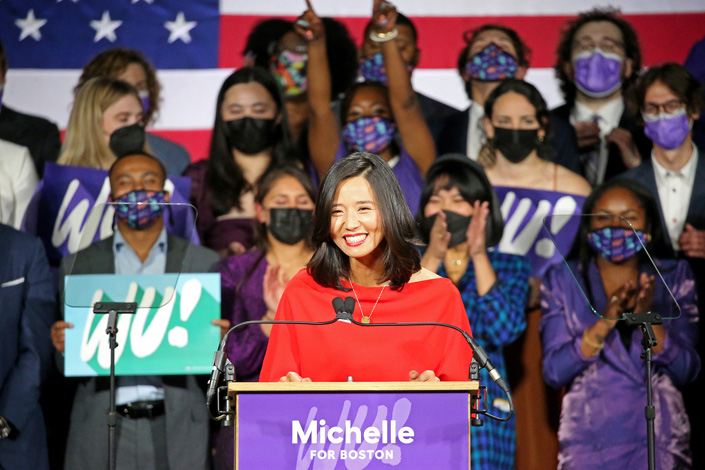Opinion: Michelle Wu’s Win Reflects Rising Representation of Asian Americans in U.S. Politics

American progressives just love the thrill of making history. On Tuesday night, they cheered for yet another historic moment when Michelle Wu (吴弭), a Democrat and daughter of immigrant parents, won the mayoral race in Boston. The 36-year-old became the first woman and first Asian American elected to the seat in the city’s hundreds of years of history.
Moreover, the victory was not Wu’s first historic achievement. In November 2013, she became the first Asian American woman to be elected as a member of Boston’s City Council; and three years later, she became the first woman of color to serve as the council president.
Wu’s victory becomes even more significant in American identity politics when we consider the fact that Wu is not a Boston native. Historically, Boston has only elected white men as mayor, and typically elects mayors who have lifelong Boston roots, according to local media. On the contrary, Wu grew up in Chicago and did not move to Boston until attending Harvard in 2007.
Just as on similar occasions before, Wu’s victory quickly resonated in China’s elite circles, being hailed as yet another sign of the rising representation of ethnic minorities, including Chinese Americans, in white-dominated U.S. politics.
Deng Jin, an alumni of the prestigious Nieman Fellowship at Harvard University, said on her social media that Wu’s victory reflected two trends: the continuous rise of minorities on the U.S. political stage since America elected the first black president in Barack Obama; and particularly, the Chinese American’s increasing interest in politics.
“I saw many friends and their children who are still high school students [in the U.S.] are rejecting the traditional philosophy of life of keeping themselves away from politics, instead, actively participating in political campaigns such as local lawmaker elections and presidential primaries, ” she wrote, “Andrew Yang’s running for president was a typical case.”
Those two trends, she continued, demonstrated that the liberal values have enjoyed popular support and that the U.S. has been undergoing a demographic transition with structural changes. Other minorities will be seen as equal to white people, she reckoned.
Deng’s view is not isolated. Remember the fanfare in China in 2011 when Gary Locke became the first Chinese American to serve as the U.S. ambassador in Beijing? The day he departed Seattle for Beijing, a photo of him carrying his own knapsack and ordering his own coffee at the airport went viral on Chinese social media platforms. Many praised his humble and low-key style.
Before his China journey, Locke won the governor’s race in the state of Washington in 1996, becoming the first Chinese American governor in American history. And in 2009 he became the first Chinese American secretary of commerce, and one of the three Asian Americans in Obama’s cabinet, including Secretary of Energy Steven Chu.
But, Wu’s success is unique as every election is unique. She is considered a protegee of Elizabeth Warren, one of the leaders in the American progressive movement, who was one of Wu’s professors in Harvard and called Wu “family.” She also worked on Warren’s 2012 U.S. Senate campaign. In the intricate U.S. election system, Wu obviously has advantages that Andrew Yang did not in his failed bid for New York City mayor this year. And so her success cannot be 100% copied elsewhere.
Zhenhua Lu is a senior editor at Caixin Global.
The views and opinions expressed in this opinion section are those of the authors and do not necessarily reflect the editorial positions of Caixin Media.
If you would like to write an opinion for Caixin Global, please send your ideas or finished opinions to our email: opinionen@caixin.com
Download our app to receive breaking news alerts and read the news on the go.
Get our weekly free Must-Read newsletter.

Lu Zhenhua is a senior editor at Caixin Global. He had worked at the South China Morning Post and the 21st Century Business Herald, reporting from Washington, Hong Kong and Brussels.
- 1China Officials Dismiss Tax Hike Rumors After Tech Selloff
- 2Cover Story: How Gutter Oil Became a Prized Fuel for International Airlines
- 3Prominent Chinese Journalist Liu Hu Detained by Police in Chengdu
- 4Maersk Unit Takes Over CK Hutchison Panama Ports After Court Ruling
- 5China Provinces Set Cautious 2026 Growth Targets
- 1Power To The People: Pintec Serves A Booming Consumer Class
- 2Largest hotel group in Europe accepts UnionPay
- 3UnionPay mobile QuickPass debuts in Hong Kong
- 4UnionPay International launches premium catering privilege U Dining Collection
- 5UnionPay International’s U Plan has covered over 1600 stores overseas



